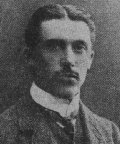 Theodor Pinet was born on August 17, 1875 in Närke (Sweden), and died in 1968. He
graduated from the Royal University of Music (Kungl. Musikhögskolan) as an organist (1896)
and as a church singer (1898).
Theodor Pinet was born on August 17, 1875 in Närke (Sweden), and died in 1968. He
graduated from the Royal University of Music (Kungl. Musikhögskolan) as an organist (1896)
and as a church singer (1898).
Pinet came from a musical family, with musical roots on both his father's and his mother's sides. The Pinet family was originally from Belgium, and his father's father had once won a gold medal in Liege for his flute play. Pinet's mother, who was Swedish, had graduated as an organist. Beside the serious studies, Theodor enjoyed composing dance music, and in 1898 his composition entitled "Saisonens vals", was accepted and published by Abraham Lundqvists förlag. At that time it was common practice, that the music dealers in Stockholm arranged concerts (by intermediary acting) for the dance musicians at the big balls, which were held in the big and, at that time, spacious Stockholm apartments. And soon Pinet became an increasingly sought-after musician at the Stockholm balls. He picked up a novelty from Paris and introduced Boston, a kind of waltz, which was very fashionable everywhere around the turn of the century. He played at the manor-houses and country-seats, and was later given the honourable commission to provide music at the Royal Palace in Stockholm, when king Oscar II invited to the balls. On the former occasions Pinet was able to manage himself on his own, but at the Royal Palace he engaged musical reinforcements from "Hovkapellet" (the Royal Opera-House Orchestra). In the summer of 1909, he played his Boston waltzes at the Stockholm Exhibition, for example "Tendresse", "Charme" and "Rysk boston". The last-mentioned piece was dedicated to the Russian Princess Maria, who had come to Sweden to marry Prince Wilhelm. The same summer Pinet also introduced his famous "Bondvals". In the fall of 1909, when the Stockholm Exhibition was over, he re-built the Circus at Djurgården, and made it to a dance palace, with an elegant dance-floor in the circus ring. Pinet's "Boston Palace" became very popular in all circles. Theodor Pinet has been related to by the posterity as the Boston King, and his name has been especially associated with the years before the World War I, but he continued to work as a dance-orchestra conductor until the 1950's. In 1923, for example, he played at the Gothenburg Exhibition. Later he also appeared at the old (open-air) dance-floor at Gröna Lund, and at Sveasalen in Stockholm. He received the Fred Winter Award in 1957. |